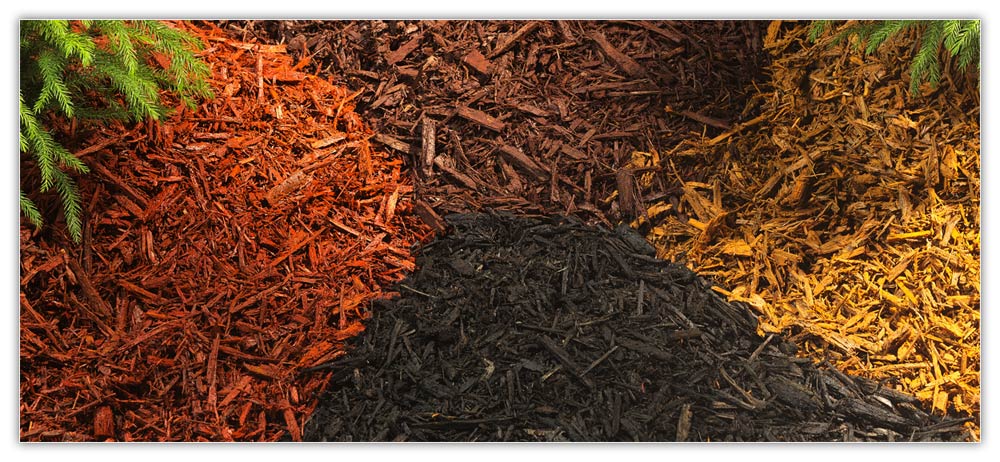
Landscaping Mulch
Selecting the Right Landscaping Mulch
There is no one, universal landscaping mulch for everything. There are pros and cons to every mulching material. Whatever the material, mulch needs to stay put to be effective, but should also be easy to remove and apply.
Natural landscaping mulches are very common and are composed of plant matter. Examples include straw, shredded leaves, bark, pine needles or wood chips.
These mulches decompose over time which helps improve the soil but it also means they must be replaced once or twice a year.
Colored mulches are made by adding a dye to a natural mulch. They typically come in colors such as brown, black or red.
Whether you’re using rich black to make your perennial garden pop or soft red to accent your home, colored mulch gives you more flexibility and creativity in your garden.
Shredded or chipped hardwood or bark
Benefits: Effective; attractive; organic.
Drawbacks: Large wood chips may wash away; as the wood decomposes, it pulls nitrogen from the soil. Avoid bargain mulches, which may contain weed seeds.
Sawdust
Benefits: Acidifies the soil for rhododendrons and blueberries; organic.
Drawbacks: Weeds sprout easily. Nitrogen fertilizer may be needed to replace the nitrogen pulled out of the soil to decompose the sawdust. A crusty top forms so it is harder for water to penetrate. Check the sawdust source carefully because it shouldn’t be from treated wood.
Straw
Benefits: Inexpensive; suppresses weeds; good for winter vegetable garden insulation; organic.
Drawbacks: Unattractive; decomposes rapidly; flammable; may contain weed seeds.
Shredded Leaves
Benefits: Free from your own yard; organic.
Drawbacks: Decomposes rapidly; large-leaf species (oaks, maples, sycamores, etc.) need to be shredded first so they don’t form a mat.
Newspaper
Benefits: Inexpensive way to recycle newspapers (use three layers); suppresses weeds; organic.
Drawbacks: Must use another mulch to weigh newsprint down; cannot use slick inserts.
Manure
Benefits: Excellent source of soil nutrients; organic.
Drawbacks: Must be aged at least six months to avoid “burning” plants. Depending on the source, it may have an odor when wet and may harbor weed seeds.
Compost
Benefits: Excellent soil amendment; organic.
Drawbacks: May contain weed seeds.
Grass Clippings
Benefits: Free from your lawn; organic if you don’t use lawn chemicals.
Drawbacks: Best used on the lawn. Use only weed-free, chemically untreated, dry clippings (clippings must be dry because wet grass can form an impenetrable crust).
Pine Needles
Benefits: Inexpensive if you have pines on your property; organic.
Drawbacks: Best for acid-loving trees and shrubs.
Gravel, Crushed Rock, Pebbles, Volcanic Rock
Benefits: Available in wide array of sizes and colors; won’t blow away or decompose.
Drawbacks: Draws heat; difficult to keep clean; difficult to remove. Avoid alkaline limestone rocks near rhododendrons and other acid-loving plants. Must use landscape fabric below rocks so they don’t migrate into the soil. Loose stones may get thrown by lawnmowers; inorganic.
Plastic
Benefits: Effective weed control. Plastic absorbs heat, which raises soil temperature so may be useful in vegetable gardens where warm soil is desired.
Drawbacks: May tear; unattractive. Plastic must be tacked down or held with another mulch. Soil cannot “breathe.” Clear plastic allows weed growth. May retain too much moisture; inorganic.
Landscape Fabric (Geo-textiles)
Benefits: Allows water and air penetration; effective in weed control.
Drawbacks: Unattractive; must be tacked down or held with another mulch. Weeds may grow through fabric cuts and cracks; inorganic.
Shredded Rubber
Benefits: Available in a variety of colors; doesn’t decompose or blow away.
Drawbacks: May be difficult to remove; flammable; inorganic.
Landscaping mulch helps in the control of weeds by cutting off sunlight for weed growth and choking the weeds. However, care should be taken in the choice and application of mulch. Thick mulch may reduce air circulation, result in water-logging especially during rainy seasons, and provide shelter to hibernating insects during winter.
Living with Nature, not against Nature should be the goal of every homeowner. One can easily have a beautiful landscape by conserving water and using recyclable material from ones own yard as landscaping mulch.
There are options to consider, like whether organic or inorganic materials work best for you, and you should understand that poor technique can actually harm your trees, encouraging rot and harm from rodents and insects. Regardless if you are the Denver or Wauconda areas, it’s worth talking with a professional!
Recent Articles
Greenwood Village Pool Removal
In this Greenwood Village Pool Removal the customer had an unusual request.He wanted the concrete po…
Centennial Pool Removal
In this Centennial Pool Removal we were approached by a realtor who introduced us to the client. Thi…
Boulder Colorado Pool Removal
With this Boulder Colorado Pool Removal project a repeating theme occurred. The customer made the de…





